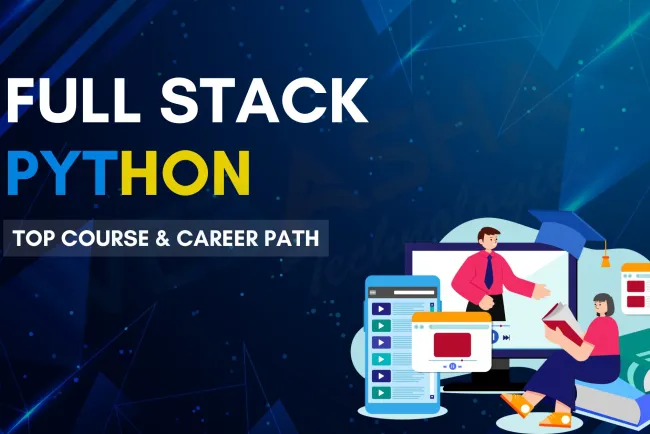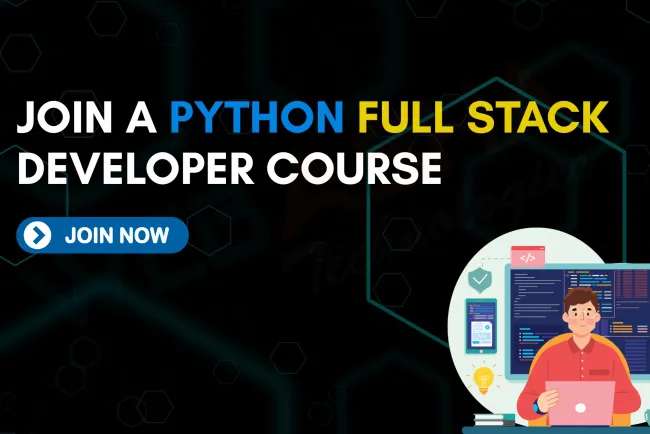Python Django Full Course | Master Django Web Development from Scratch
Enroll in a Python Django Full Course to become a skilled web developer. Learn Django framework from basics to advanced with hands-on projects, certification, and expert guidance.

Python Django is one of the most popular web development frameworks in the world today. Combining the simplicity of Python with the powerful, scalable, and secure architecture of Django, it allows developers to build robust web applications quickly and efficiently. If you want to become a professional web developer or enhance your skills, enrolling in a Python Django Full Course is a smart choice. This blog will cover everything you need to know about a complete Django course — from the fundamentals to advanced topics, career benefits, and learning resources.
What Is Python Django?
Django is a high-level Python web framework that encourages rapid development and clean, pragmatic design. Created in 2005, Django provides developers with a structured approach to building web applications, handling everything from database management to user authentication and templating.
Because Django follows the "batteries-included" philosophy, it offers ready-to-use components such as an ORM (Object-Relational Mapper), an admin interface, and built-in security features. This makes it highly suitable for projects ranging from simple websites to complex enterprise applications.
Why Learn Django Through a Full Course?
While you can learn bits and pieces from various tutorials, a full course on Python Django provides a structured, comprehensive, and step-by-step path that ensures you gain deep knowledge and practical skills. A full course covers essential concepts, hands-on coding exercises, real-world projects, and career guidance.
Key Topics Covered in a Python Django Full Course
A well-structured Django full course typically includes:
1. Python Fundamentals for Django
-
Python basics: variables, data types, loops, functions
-
Object-Oriented Programming (OOP) concepts
-
Working with modules and libraries
2. Introduction to Django Framework
-
Django installation and setup
-
Project and app structure
-
Understanding Django’s MTV (Model-Template-View) architecture
3. Working with Django Models and Databases
-
Defining models
-
Using Django ORM to interact with databases
-
Migrations and schema changes
4. Django Views and URL Routing
-
Creating views to handle HTTP requests
-
URL dispatching and routing
-
Class-based vs function-based views
5. Templates and Frontend Integration
-
Django template engine basics
-
Template inheritance and filters
-
Static files management (CSS, JS, images)
6. Forms and User Input Handling
-
Creating forms using Django forms module
-
Validation and error handling
-
Model forms for database integration
7. User Authentication and Authorization
-
User registration and login system
-
Permissions and user roles
-
Password management and security best practices
8. Advanced Django Features
-
Django REST Framework for building APIs
-
Middleware and signals
-
Caching and performance optimization
9. Testing and Debugging
-
Writing unit tests for Django applications
-
Debugging tools and techniques
10. Deployment
-
Preparing Django apps for production
-
Hosting options and deployment tools (Heroku, AWS, DigitalOcean)
-
Managing static and media files in production
11. Real-World Projects
-
Building complete applications such as blogs, e-commerce, or social media apps
-
Integrating third-party APIs
-
Implementing payment gateways and notifications
Benefits of Completing a Python Django Full Course
Career Growth
Mastering Django opens doors to roles like backend developer, full-stack developer, and web developer, which are in high demand globally.
Practical Experience
Full courses emphasize project-based learning, so you graduate with a portfolio of real applications demonstrating your skills.
Versatility
Django is used by startups and large companies alike (Instagram, Spotify, Pinterest). Skills you learn are highly transferable.
Community and Resources
Django has a large, active community, which means continuous learning support, extensive documentation, and frequent updates.
How to Choose the Right Python Django Full Course?
When selecting a course, consider the following factors:
-
Curriculum: Ensure it covers everything from basics to advanced topics.
-
Hands-on Projects: Practical coding assignments are essential.
-
Trainer Expertise: Experienced trainers provide real-world insights.
-
Certification: A recognized certificate adds value to your resume.
-
Placement Assistance: Look for courses offering career guidance.
-
Mode of Training: Choose between online or classroom, based on your preference.
Where to Find Quality Python Django Full Courses?
Many training platforms and institutes offer comprehensive Django courses. For example, WebAsha offers an expertly designed Python Django Training Course with detailed syllabus, real-time projects, and certification — ideal for beginners and professionals alike. You can check out more details at:
https://www.webasha.com/courses/python-django-training-course
Conclusion
A Python Django full course equips you with essential web development skills, from understanding Python basics to deploying fully functional Django applications. With its structured curriculum and practical approach, you can accelerate your career and build a strong foundation in backend web development.
Start your Django learning journey today to open exciting opportunities in the fast-growing web development landscape.
FAQs
What is a Python Django full course?
A Python Django full course is a comprehensive training program covering the fundamentals of Python and Django framework, designed to teach you how to build web applications from scratch.
Who should take a Django full course?
This course is ideal for beginners in web development, Python programmers, software developers, and students aspiring to become full-stack or backend developers.
How long does it take to complete a Django full course?
A typical Django full course takes 6 to 12 weeks, depending on your learning pace and the course structure (part-time or full-time).
Do I need to know Python before learning Django?
Yes, a basic understanding of Python programming is essential before learning Django, as the framework is built on Python.
What topics are covered in a Django full course?
Key topics include Django installation, models, views, templates, forms, user authentication, REST API integration, deployment, and real-world project development.
Is the Django full course suitable for beginners?
Yes, most full courses start from Python basics and gradually progress to advanced Django concepts, making it suitable for beginners.
Will I get a certificate after completing the Django course?
Yes, most reputable training providers, like WebAsha, offer certification upon successful course completion.
What kind of projects will I build in a full Django course?
You will typically build blog applications, e-commerce sites, admin dashboards, APIs, and more to gain real-world experience.
Does the course include Django REST Framework?
Yes, advanced Django courses often include Django REST Framework (DRF) for building scalable APIs.
Are there job opportunities after completing a Django full course?
Absolutely. Completing a full Django course prepares you for roles like Python Developer, Backend Developer, or Full Stack Developer.
Can I learn Django online?
Yes, many institutes offer Django full courses online with live classes, recorded lectures, and hands-on project support.
How much does a Django full course cost?
The cost can vary between ₹10,000 to ₹50,000 depending on the institute, course duration, and included features.
Is Django still in demand in 2025?
Yes, Django remains one of the top web frameworks in 2025 due to its rapid development capabilities, security, and scalability.
What are the prerequisites for a Django full course?
Basic knowledge of Python and web fundamentals (HTML, CSS) is usually required.
Does the Django course cover deployment?
Yes, full courses typically include deploying Django apps to platforms like Heroku, AWS, or DigitalOcean.
Is Django better than Flask for full courses?
For larger applications and enterprise-level projects, Django is often preferred due to its built-in tools and structure.
Can I get placement assistance after the course?
Some training institutes, like WebAsha, offer placement assistance to help students find job opportunities post-course.
What is the average salary after a Django course?
Entry-level Django developers can earn between ₹4 LPA to ₹8 LPA, with higher potential as experience grows.
Is Django hard to learn?
Django is relatively easy to learn for those familiar with Python and has extensive documentation and community support.
Can I learn Django without prior coding experience?
It's possible, but it is highly recommended to first learn Python basics before starting Django.
Is there a certification exam for Django?
Some institutes offer internal certification exams, while others prepare you for industry-recognized Python developer certifications.
Will this course teach full stack development with Django?
Yes, full courses often include frontend basics and integration with Django to teach full stack web development.
How many hours per week should I study Django?
A consistent 6–10 hours per week is ideal to complete the course and practice building projects.
What tools will I use in a Django full course?
You'll use tools like VS Code, Git, GitHub, PostgreSQL/MySQL, and cloud platforms for deployment.
Are Django courses suitable for working professionals?
Yes, many courses are designed with flexible schedules and weekend batches for working professionals.
Do I need a computer science degree to learn Django?
No, a degree is not required. Practical coding skills and project experience are more valuable.
Can I build an e-commerce site using Django?
Yes, Django is well-suited for building secure and scalable e-commerce platforms.
Is Django used by major companies?
Yes, companies like Instagram, Pinterest, and Mozilla have used Django for their backend architecture.
What is the job role of a Django developer?
A Django developer builds, maintains, and deploys web applications using Django, focusing on server-side logic and integration.
Does the Django course include Git and version control?
Yes, most courses include Git basics and version control to manage your projects effectively.














![Top 10 Ethical Hackers in the World [2025]](https://www.webasha.com/blog/uploads/images/202408/image_100x75_66c2f983c207b.webp)








